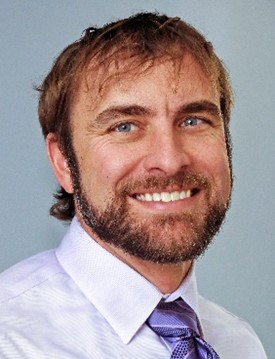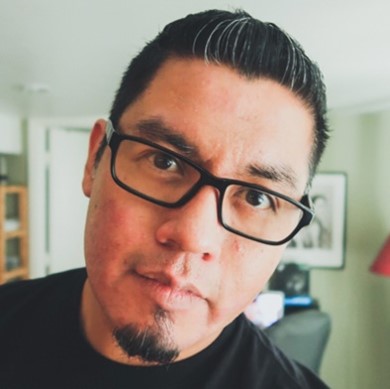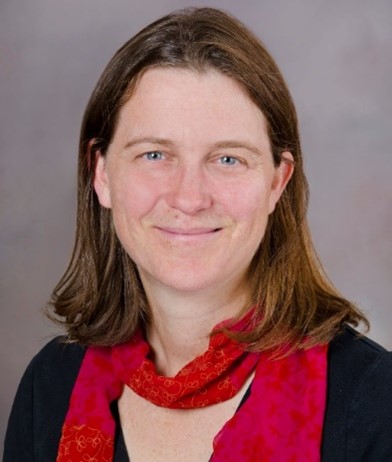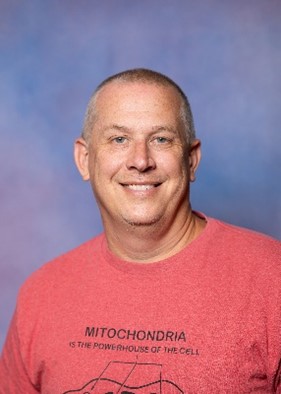Speaker Bios
Kent Crippen, Ph.D.
Professor of STEM Education, University of Florida

Crippen's research program embraces the grand challenge of providing an inclusive and robust science, technology, engineering, and mathematics (STEM) workforce by designing, developing, and evaluating learning environments that offer authentic experiences through learning technologies.
Matthew DeCamp, MD. PhD
Associate Professor, University of Colorado Anschutz

Matthew DeCamp, MD, PhD, is an Associate Professor in the Center for Bioethics and Humanities and Division of General Internal Medicine. A practicing internist, health services researcher, and philosopher, Dr. DeCamp employs empirical and conceptual methods to identify and solve cutting edge problems at the interface of health care, policy, and bioethics. Special emphases of his research include ethical issues in artificial intelligence (AI), engaging patients in health care organizational decision-making, and global health (with a focus on short-term global health ethics). He serves as Director of Research Ethics for the Colorado Clinical and Translational Sciences Institute (CCTSI). During 2024-2025, Dr. DeCamp is beginning a multi-year grant as Co-Principal Investigator (with Bethany Kwan) of a Patient Centered Outcomes Research Institute project comparing different methods of community engagement in research. He continues as Principal Investigator of an NIH/NINR R01 on the use of AI-based prognostication in palliative care, and will complete a Greenwall Foundation Making a Difference grant examining ethics and patient-facing chatbots.
Theresa W. Gillespie, Ph.D., M.A., F.A.A.N
Professor, Emory University School of Medicine & Winship Cancer Institute

Dr. Gillespie is the Looney Family Professor of Cancer Research in the Department of Hematology and Medical Oncology and Department of Surgery in the Emory University School of Medicine. She also serves as Associate Director for Community Outreach and Engagement at the Winship Cancer Institute, an NCI-designated comprehensive cancer center, and as Director for the Winship Center for Cancer Health Equity Research. Dr. Gillespie’s research has focused on disparities as they impact clinical trials, decision-making, workforce equity, and cancer outcomes, working with diverse target populations including patients, communities at risk, people with HIV, veterans, and rural populations. She serves as m-PI with Dr. Adam Marcus for the NIGMS SEPA program grants.
Dr. Etienne Gnimpieba
Research Assistant Professor of Bioinformatics and Director of Bioinformatics Core at SD INBRE

Dr. Etienne Z. Gnimpieba is a Research Assistant Professor at the University of South Dakota, where he leads a bioinformatics and computational bioengineering lab dedicated to pioneering AI and machine learning (ML) approaches for decoding complex biological systems. His research integrates computational modeling, bioinformatics, and multi-omics data analysis to predict intricate biological behaviors. His lab has laid a solid foundation in multi-omics integration, positioning them to advance digital twin technologies that model the cell microenvironment for therapy development. Dr. Gnimpieba's work is driven by a commitment to advancing scientific knowledge and enriching the research environment at USD by actively involving undergraduate students in high-impact biomedical research. Over the past five years, he has directly mentored more than 25 undergraduates, who have co-authored peer-reviewed publications and presented at national conferences. His educational efforts align with the mission of preparing students at undergraduate-focused institutions for impactful careers in biomedical sciences. His lab’s achievements include bioinformatics workflows and AI/ML models that enhance multi-omics data analysis, contributing to a deeper understanding of biological systems from gene regulation to cell-microbe interactions. With a successful track record in securing NIH- and NSF-funded projects, Dr. Gnimpieba continues to expand his work in digital twin technology and multi-omics, providing robust training platforms that equip students with critical skills in data science and biomedical research. These endeavors support the scientific community by revealing new insights into the dynamics of tumor microenvironments and influencing the development of future cancer therapies. Dr. Gnimpieba has held significant leadership roles in various projects, such as being the Project Lead of the Bioinformatics Core for the South Dakota Biomedical Research Infrastructure Network, Co-PI in the TRIADS training program, PI for the Single Cell Genomics and Metagenomics infrastructure development, and Co-PI in projects focused on material discovery and expanding research, education, and innovation in South Dakota. These projects reflect his extensive involvement in enhancing bioengineering innovation and research capabilities at a regional and national level.
Jeffrey Good, Ph.D.
Professor, Director of UM Genomics Core, University of Montana

Dr. Good is a professor of biology and Director of the Genomics Core Facility at the University of Montana. His research program combines population genetics and functional genomics to understand the evolution of reproduction and environmental adaptation in diverse mammalian systems.
Susan Gregurick, Ph.D.
NIH Associate Director for Data Science and Director, NIH Office of Data Science Strategy

Susan K. Gregurick, Ph.D., was appointed Associate Director for Data Science and Director of the Office of Data Science Strategy (ODSS) at the National Institutes of Health (NIH) on September 16, 2019. Under Dr. Gregurick’s leadership, the ODSS leads the implementation of the NIH Strategic Plan for Data Science through scientific, technical, and operational collaboration with the institutes, centers, and offices that comprise NIH. Dr. Gregurick received the 2020 Leadership in Biological Sciences Award from the Washington Academy of Sciences for her work in this role. She was instrumental in the creation of the ODSS in 2018 and served as a senior advisor to the office until being named to her current position. Full Bio at datascience.nih.gov/director.
Vibhuti Gupta, Ph.D.
Assistant Professor, Dept. of Computer Science and Data Science, School of Applied Computational Sciences, Meharry Medical College

Dr. Gupta is an Assistant Professor in the Department of Computer Science and Data Science in the School of Applied Computational Sciences at Meharry Medical College. He has a Ph.D. in computer science from Texas Tech University and postdoc from University of Michigan. Dr. Gupta’s research interests lie at the intersection of AI/ML and medicine with the goal of organizing, processing, and transforming healthcare data into actionable knowledge that is equitable, ethical, and explainable. He is specifically interested in analyzing multimodal, and longitudinal time varying data streams generated from digital health devices (e.g., mHealth apps, wearable devices) with translation to early diagnosis and prevention of complex human diseases. The overarching goal of Dr. Gupta’s research is to develop the computational methods and tools required to organize, process, and transform healthcare data into actionable knowledge along with the considerations of explainability, ethics, and fairness.
William Hersh, M.D., FACMI, FAMIA
Professor, Oregon Health & Science University

Dr. Hersh is a Professor in the Department of Medical Informatics and Clinical Epidemiology at Oregon Health & Science University. He served as inaugural Chair of the department from 2003-2022 and as inaugural Director of its graduate program from 1996-2023. His research interests focus on information retrieval as well as competencies and curricula for clinical and informatics professionals in biomedical informatics and data science. Along with Dr. Karstens, he runs the College Undergraduate and Graduate Biomedical Informatics and Data Science Internship Program at OHSU.
Lisa Karstens, Ph.D.
Associate Professor, Oregon Health & Science University

Dr. Karstens is an Associate Professor at Oregon Health & Science University in the Departments of Medical Informatics and Clinical Epidemiology and Obstetrics and Gynecology. Her research interests broadly span using bioinformatics to understand complex human disease, with a focus on women’s health and bladder disorders. In partnership with Dr. Hersh, she oversees the College Undergraduate and Graduate Biomedical Informatics and Data Science Internship Program at OHSU. She additionally leads the Health Data Ethics and Equity Seminar for interns in the program.
Alison Lin, Ph.D.
Lead, Training, Workforce Initiatives, and Community Engagement, NIH ODSS

Dr. Alison Lin joined ODSS in 2022 to lead the Training, Workforce Initiatives and Community Engagement team. In this role, she is responsible for the planning and implementation of strategies to grow a diverse and strong data science workforce that serves all communities. Dr. Lin oversees the management of programs including the DATA National Scholar program and the DataPath Program. Beginning in 2012, Dr. Lin served as Program Director and later Deputy and Acting Branch Chief at the Diversity Training Branch (DTB) of the National Cancer Institute’s (NCI’s) Center to Reduce Cancer Health Disparities (CRCHD). She has developed and led several significant efforts in promoting the cancer research workforce diversity both extramurally and intramurally, including the NCI Youth Enjoy Science (YES) Research Education Program (R25), the Early Investigator Advancement Program and the intramural training program iCURE. She also led the management of the diversity and re-entry and re-integration supplement programs at NCI. Prior to joining NCI, Dr. Lin served as an Instructor in Medicine at Harvard Medical School in Boston, MA. She conducted interdisciplinary research focused on understanding the molecular interactions of membrane proteins and their signaling mechanisms, particularly those that modulate the cytoskeleton. Dr. Lin received her Ph.D. in physics/biophysics from the University of California, Santa Barbara and her B.S. in physics, summa cum laude, from the University of Minnesota, Twin Cities.
Adam Marcus, Ph.D.
Professor, Emory University School of Medicine & Winship Cancer Institute

Dr. Marcus is a tenured Professor in the Department of Hematology & Medical Oncology, and serves as the Deputy Director of the Winship Cancer Institute, an NCI-Designated Comprehensive Cancer Center. He has maintained an NIH-funded laboratory for the past 18 years that spans basic, translational, and community-engaged research. He co-leads the NIGMS SEPA program with Dr. Gillespie using a data science-based curriculum that explores health disparities in an experiential learning environment tailored to Title I middle schools in Georgia.
Jill A Macoska, Ph.D.

Dr. Macoska is a Distinguished University Professor of Science and Mathematics, the Director of the Center for Personalized Cancer Therapy, and the Alton J. Brann Endowed Chair at the University of Massachusetts Boston. She has led peer-reviewed and NIH-funded research for the past 30 years focused on elucidating the molecular genetic alterations and dysfunctional inter- and intra- cellular signaling mechanisms that promote urinary tract (kidney, bladder, prostate) pathobiologies, including cancer and fibrosis. Along with Adán Colón-Carmona, she is the PI of the NIH/NCI-funded University of Massachusetts Boston - Dana-Farber/Harvard Cancer Center U54 Comprehensive Partnership for Cancer Disparities Research, and leads the work associated with the supplement to the parent grant on Undergraduate Integrated Training in Computational Genomics and Data Sciences.
Andrew Martinez
Research Coordinator for the Collaboratory for Indigenous Data Governance The Native Nations Institute and the Udall Center to Studies in Public Policy, University of Arizona

Andrew Martinez is a citizen of the Salt River Pima Maricopa Indian Community in Scottsdale Arizona. He is also Diegueno/Iipay with maternal ties to the Mesa Grande Band of Mission Indians in San Diego County. Andrew currently serves as the Research Coordinator for the Collaboratory for Indigenous Data Governance. His work focuses on supporting tribal data rightsholders in controlling and benefiting from their data. He and his team collaborate with partners to develop tools, policies, and practices that uphold Indigenous Data Sovereignty, ensuring data is used in ways that align with Indigenous values, priorities, and rights.
Lisa K. Marriott, Ph.D.
Associate Professor, OHSU-PSU School of Public Health, Oregon Health & Science University

Dr. Lisa Marriott is an Associate Professor in the OHSU-PSU School of Public Health studying applied science education and biomedical workforce development. Her work expands opportunities for multi-level trainees to engage in STEM development research, with outcomes benefitting current and future trainees of biomedical workforce initiatives. Her work launched two informatics-based platforms for tailored education and research, serving as principal investigator of three NIH-funded Science Education Partnership Awards (SEPAs) focused on data science training. Marriott’s most recent SEPA, "Community-engaged research partnerships for building capacity and training in inclusive data science", provides infrastructure for engaging youth in biomedical training and measuring outcomes across STEM programs and NIH initiatives. Marriott is co-investigator of biomedical research training grants across NIH institutes (e.g., NIGMS BUILD, NCI YES, NIEHS SBIR), enabling broader study of near-peer mentoring across biomedical research training programs. She teaches biomedical research pathways, environmental health, and qualitative methods, with her work receiving an Excellence in Diversity, Equity, Inclusion, and Accessibility Mentoring Award from NIH in 2022.
Fortune Mhlanga, Ph.D.
Founding Dean, School of Applied Computational Sciences and Senior Vice President, Enterprise Data and Analytics, Meharry Medical College

Dr. Fortune Mhlanga is currently serving as founding senior vice founding president of enterprise data and analytics and founding dean of the School of Applied Computational Sciences (SACS) at Meharry Medical College (Meharry), Nashville, Tennessee. Before joining Meharry, he was dean of the College of Computing and Technology (CCT) and professor of computer science, data science, and software engineering, at Lipscomb University, Nashville, Tennessee. He was professor of computer science in the School of Information Technology and Computing (SITC) at Abilene Christian University (ACU) from August 2007 to July 2011 where he also assumed the role of director of the SITC during his last year. Prior to joining ACU, he was associate professor and subsequently professor and founding chair of the computer science department at Faulkner University, having moved there in 2002 from the Scientific and Industrial Research and Development Centre (SIRDC) in Harare, Zimbabwe where he served as founding Director of the Informatics and Electronics Institute (IEI) from 1997 to 2002. He was a senior lecturer in the computer science department at the University of Zimbabwe from 1993 to 1994, and subsequently senior lecturer and chair in the same department until December 1997. While at SIRDC, Dr. Mhlanga represented Zimbabwe on many forums at international level related to information and communication technologies (ICT) for development. In 2000 and 2001, he represented Zimbabwe on an Expert Group of IT, which was established by the Commonwealth Heads of Government of the High Level Review Group to tackle the problem of the digital divide in Commonwealth countries. Subsequently, he was instrumental in positing Zimbabwe’s Knowledge Economy initiative whose overall purpose is to promote and encourage Zimbabwe to invest in its national information infrastructures so that it can participate in knowledge-based development and experience the predicted social and economic benefits. In 2009, Dr. Mhlanga was sponsored by UNCTAD (the United Nations Conference on Trade and Development) to the 5th World Summit on Internet and Multimedia held in Shenyang, China. In 2010, he was awarded a fellowship by the United Nations’ International Organization for Migration (IOM) to assist with capacity building through graduate training and mentoring at the University of Zimbabwe. In 2017, Dr. Mhlanga was awarded a fellowship by the Carnegie African Development Program to travel to Nigeria to work with Ebonyi State University on capacity building in the areas of algorithms and theory of computation, working mainly with graduate students and faculty. Dr. Mhlanga earned his Bachelor’s degree in computer science from Harding University in 1984, and his Master’s and PhD degrees in computer science from New Jersey Institute of Technology in 1989 and 1993, respectively. His PhD work focused on database management systems which resulted in conception of a Data Model and Query Algebra for Office Documents.
Nathan Reyna, Ph.D.
Professor of Biology, AR-INBRE and Ouachita Baptist University

Dr. Reyna is a faculty member in the Biology Department at Ouachita Baptist University, a PUI in Southwest Arkansas. He has been involved with the AR-INBRE program for fifteen years. Dr. Reyna is the PI of the NSF-funded Cell Biology Education Consortium (CBEC / www.cellbioed.com). The CBEC focuses on incorporating cancer cell culture into the undergraduate classroom. Together with Lori Hensley (Jacksonville State Univ/ AB), Kristen Johnson (University of New Hampshire-Manchester/NH-INBRE), Dr. Reyna created the CBEC to help expand our NIH/INBRE-funded research into the classroom. The CBEC is in its second round of NSF funding and has over 250 faculty members representing 20 states.
Kristen Rhinehardt, Ph.D.
Associate Professor, Computational Data Science and Engineering, North Carolina A&T State University

Kristen Rhinehardt, Ph. D is an Associate Professor in Computational Data Science and Engineering (CDSE) at North Carolina A & T State University (NCA&T). She graduated from Cornell University with a degree in Biological Engineering (minor in Biomedical Engineering) in 2010. She then furthered her education at NCA&T where in 2012 she completed her Master’s degree, becoming the first person to earn a degree in Nanoengineering. In 2015 she earned her Ph.D in Nanoengineering focusing on in-vitro and in-silico biosensor design. Upon joining the NCA&T faculty in 2019, she founded of the Computational Molecular Engineering Lab where she uses in-silico approaches to build, analyze, characterize and predict the form and function of biologics and biomaterials for engineering applications and public health. Dr. Rhinehardt is also the Assistant Director for High Performance Computing of the NCA&T Visualization and Computation Advancing Research (ViCAR) Center, Faculty Advisor for the NCA&T Society of Women Engineers and the current chair of the North Carolina System Faculty Assembly HMSI Committee. Dr. Rhinehardt is committed to conducting research that improves the quality and understanding of biological systems while bridging the gaps between communities and technological advancement.
Chase Stratton, Ph.D.
Assistant Professor of Biology, Delaware State University

Dr. Chase Stratton’s research background is in sustainable pest management and data science. He studies ways to manipulate agricultural settings with natural products that reduce insect pest presence or damage with minimal environmental impacts. Dr. Stratton is generally interested in plant-insect-microbe interactions, chemical ecology, bioinformatics (specifically in the realm of plant phylogenies), cheminformatics, and writing code to assist in complex analyses. As the director of the Data Science Research and Education Hub at DSU Downtown, Dr. Stratton is expanding the machine learning infrastructure available to DSU faculty and students and will provide training opportunities for anyone interested in exploring high-performance computing in their research. His current focus involves the development of an artificial intelligence called aiNsect. This digital brain will allow scientists to translate their research into agricultural, health, and basic ecological outcomes.
Peggy Timothé, DDS, MPH
Associate Professor and Director of the Biomedical Informatics and Behavioral Sciences Summer Program, Texas A&M University College of Dentistry

Dr. Peggy Timothé, a native New Yorker, received the Bachelor of Arts degree and the Doctor of Dental Surgery degree from New York University. She completed the Advanced Education in General Dentistry (AEGD) residency program at the Lutheran Medical Center, Brooklyn, NY. She later received the Master of Public Health degree from the Harvard School of Public Health. She completed the Advanced Education in Dental Public Health (DPH) Residency at the Centers for Disease Control and Prevention in Atlanta, GA. She is board certified in the specialty of DPH and has extensive experience in academic and clinical dentistry, community dental programs, and research. Her expertise includes pre-doctoral curriculum development and improving dental care delivery models. Dr. Timothé currently lives in Dallas, TX and is an Associate Professor of Public Health Sciences. She serves as the program director of the Advanced Education Program in DPH at the Texas A&M University College of Dentistry, and Principal Investigator of several state and federal grants focused on community-based programs and enhancing the oral health workforce.
Steve Tsang, Ph.D.
Lead, Clinical Informatics, NIH Office of Data Science Strategy

Dr. Steve Tsang is the lead of the Clinical Informatics team for ODSS. In this role, he promotes the use of clinical standards, such as Fast Healthcare Interoperability Resources (FHIR), in biomedical research by developing and conducting training and education activities. Steve has spent most of the last two decades at the NIH in various capacities. Prior to joining ODSS, he was a program officer at NIAID where he administered and oversaw data science projects in immune-mediated and infectious diseases. For the broader research community, Steve has been promoting data science training as well as the use of emerging technologies including cloud computing, software containerization, and workflow management for reproducible biomedical data science research. He received a B.S. in Biochemistry from University of Maryland College Park and a Ph.D. in biology/structural bioinformatics from the Johns Hopkins University, as part of the NIH Graduate Partnerships Program (GPP).
Homayoun Valafar, Ph.D.
Chair of Computer Science & Engineering, Director of the AI Institute, University of South Carolina

Dr. Homayoun Valafar is the Department Chair of Computer Science and Engineering and the Director of the Artificial Intelligence Institute at the University of South Carolina. He also serves as the Director of the Bioinformatics Core for the South Carolina IDeA Networks of Biomedical Research Excellence (SC INBRE) project. With over 35 years of experience in research and development, Dr. Valafar has made significant contributions to Artificial Intelligence and Machine Learning across various domains, including health sciences, genomics, proteomics, drug discovery, and the creation of intelligent diagnostic and prognostic tools. His work has advanced the application of AI/ML in solving complex biomedical challenges. In addition to his research endeavors, Dr. Valafar is deeply committed to workforce development in Data Science. He has played a pivotal role in designing Data Science degree programs, developing AI/ML-focused curricula such as certificates, concentrations, and specializations, and organizing condensed training sessions to equip professionals with cutting-edge skills.
Qingguo Wang, Ph.D.
Professor, Meharry Medical College

Dr. Qingguo Wang is a Professor in the School of Medicine at Meharry Medical College (MMC). His research is in the interdisciplinary field of data science, computational biology, and cancer genomics. He developed several popular software, e.g., VirusFinder, which characterizes integration sites of undiagnosed viruses through genomic sequencing data. With his expertise in computing and genomics, currently he serves as Director of Genomic Data Core at MMC. Besides research, he is also committed to teaching and training students’ data analyst skills. Many projects that he developed in classroom were published in journals or conference proceedings, with students as first or co-authors (>30 students are co-authors of his publications).